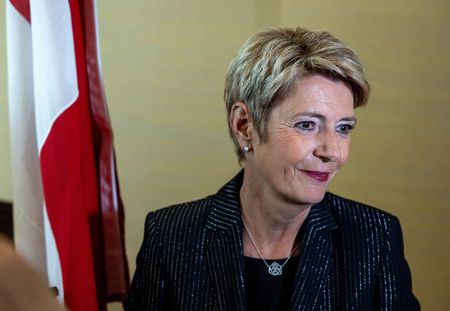By William Schomberg
LONDON (Reuters) -British finance minister Rachel Reeves faces an “impossible trilemma” of big tax hikes, spending cuts or a change to fiscal rules that she has said are non-negotiable, a leading think tank said on Wednesday.
Reeves looks on course for a projected 41 billion-pound ($54 billion) overshoot later this year of her target to cover day-to-day spending with tax revenues by the end of the decade, the National Institute of Economic and Social Research said in a report.
If she also wants to restore a previous 9.9 billion pound fiscal buffer, Reeves might need to find more than 50 billion pounds of savings or extra taxes in the annual budget statement which is due in the autumn, NIESR said.
Reeves and Prime Minister Keir Starmer are struggling to meet mounting demands for spending from the already stretched public finances as they struggle to speed up Britain’s economic growth.
Reeves last year raised taxes by 40 billion pounds, something she has said she will not repeat.
NIESR nudged up its forecast for British economic growth for this year to 1.3% from its forecast of 1.2% made in May. But it cut its projections for all the following years up to 2030, largely due to the impact of U.S. President Donald Trump’s trade tariffs on the global economy.
The forecasts are significantly weaker than those of the Office for Budget Responsibility, whose projections underpin the government’s tax and spending plans. For example, NIESR expects 1% growth in 2028 compared with the OBR’s 1.7%.
Economists with several banks expect Reeves will face a roughly 20 billion-pound shortfall when the OBR publishes its next forecasts alongside her budget statement probably in October or November. Much of that shortfall is due to government U-turns on plans to cut welfare for the long-term sick and fuel subsidies for retired people.
Stephen Millard, NIESR’s deputy director for macroeconomics, said the difference between those forecasts and NIESR’s 41 billion-pound estimate of the shortfall probably lay largely in the think tank’s lower forecasts for economic growth.
In May, NIESR said Reeves was on course for an even bigger 57 billion-pound miss against her balanced current budget target. Millard said the reduced shortfall reflected stronger data on government revenue.
The think tank said British inflation was likely to average 3.3% over 2025 before falling to 2.8% and 2.2% in the next two years. It expects the BoE to cut interest rates on Thursday and in November and added a further early-2026 cut to its outlook.
NIESR said living standards would edge up in the 2025/26 tax year for most households but fall for the poorest 10% who are hit harder by higher rent, food and energy costs and a freeze in the threshold for starting to pay income tax.
($1 = 0.7535 pounds)
(Writing by William SchombergEditing by Alexandra Hudson)










